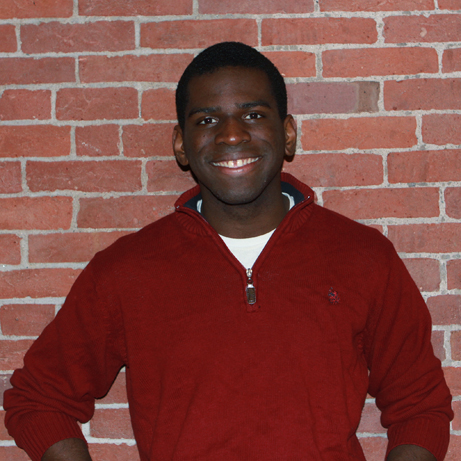
As Mayor Toni Harp makes education a primary focus of her campaign for re-election, Ugonna Eze ’16, the Republican candidate for Ward 1 alder, has brought that focus to campus.
Eze, who will face incumbent Sarah Eidelson ’12 in November, discussed his plans for education policy during an event on Old Campus Friday afternoon, attended by roughly 40 people. Eze said his proposals aim to increase parental involvement in children’s education and to address the racial achievement gap. Eze said as alder, he will push for Yale students to become more active in New Haven’s education system, echoing a theme he has maintained throughout his campaign.
In remarks before the assembled crowd, Eze said low educational achievement is driving many of the problems that vex the Elm City.
“Education seems to be the biggest barrier to addressing unemployment and addressing the housing problem here in New Haven,” he said. “We won’t make any progress on these issues unless we get Yale involved.”
Eze identified “summer slippage” — when students partially regress in educational achievement over the summer — as one of the problems he will seek to address as alder. He noted that the problem hits low-income and ethnic minority students the hardest. Programs that keep students intellectually engaged over the summer are out of reach for many families in those demographics, he said, resulting in an achievement gap between them and their wealthier classmates.
The racial disparity in educational achievement is highly visible in New Haven, Eze said, adding that dropout rates stand at 25 percent for ethnic minorities and only 10 percent for Caucasians.
Eze’s proposals for addressing these problems are manifold. He said that, as alder, he will push for the creation of a map of the city’s educational resources — schools and summer programs alike — for parents to consult, a strategy strikingly similar to a project Eidelson completed last year that plotted the city’s youth programming onto a map for parents.
He added that he will work with literacy advocacy groups like New Haven Reads and the Literacy Coalition to improve literacy rates, which he said might help New Haven residents find jobs that pay a living wage.
Attendees interviewed at the event largely supported Eze’s proposals. Benjamin Rasmussen ’18 said creating links with parents is crucial.
“Growing up, my family motivated me a lot academically,” he said. “If I didn’t have strong parental guidance, I wouldn’t be here today.”
Samuel Kim ’16 echoed that sentiment. He said students spend half the day with their teachers in the classroom, but they spend the other half with their parents. As a result, Kim said, the importance of parental engagement in education should not be overlooked.
Kai Dougan ’19 said he concurred with Eze on the need to better integrate Yale students into the city’s educational system.
“We have a huge resource here, and a huge money resource, with students with a diverse range of skills, and it’s time we put that to use,” he said.
Eze’s focus on educational policy comes as decades of poor test results in the New Haven Public Schools spark a renewed push for improvement. At a Board of Education meeting last Tuesday, Harp unveiled a 10-point plan for raising test scores, which included extended school days, a review of classroom practices and efforts to help parents improve their children’s reading scores.
Harp was elected president of the Board of Education in September, a move that has garnered criticism from some of her opponents, especially mayoral candidates Ron Smith and Sundiata Keitazulu. Both men said her role as president of the board — a body with a largely mayor-appointed leadership — is a “conflict of interest.”
Eze said he does not share those concerns. He said he has no problem with Harp serving as president if such a move is necessary to deliver the results the city needs.
“It’s good that the mayor is getting involved in terms of education in New Haven,” he said. “New Haven is facing a serious educational crisis.”







